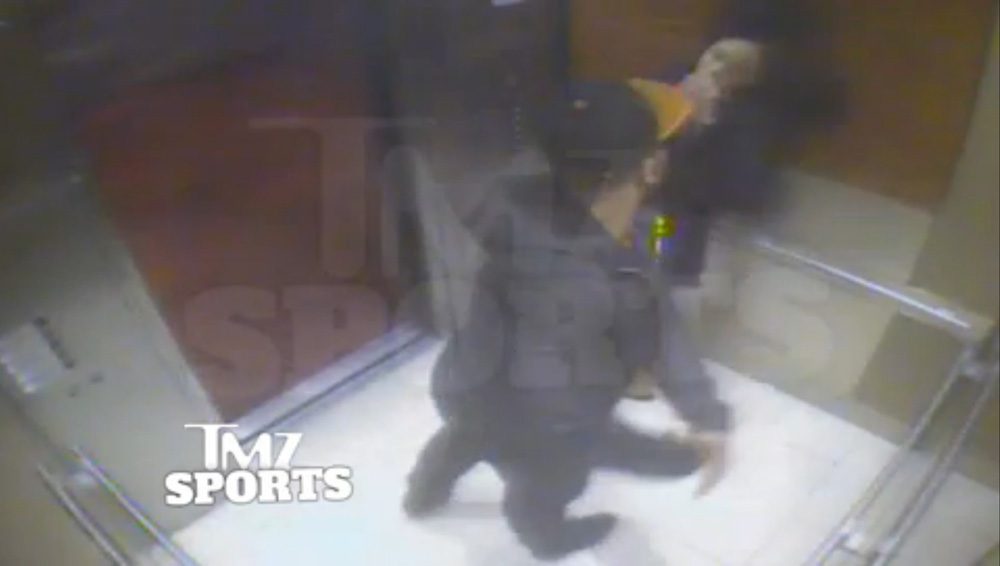Advertisement
After Ray Rice Video, #WhyIStayed #WhyILeft Highlight Powerful Stories Of Domestic Violence

The release of a graphic surveillance video Monday showing Baltimore Ravens running back Ray Rice knocking out his then-fiancee, Janay Palmer, in a hotel elevator in February has spurred a powerful conversation about domestic violence and the intricacies of navigating an abusive relationship.
The couple is now married, and after the release of the video Rice was released by the Ravens and suspended indefinitely by the NFL.
Then Monday night, using #WhyIStayed and #WhyILeft, Twitter users told stories of abuse and survival, addressing the often-asked question in cases of domestic violence: "Why doesn't she just leave?"
Here is a sampling of some of those tweets:
[storify url="https://storify.com/wbur/whyistayed-whyileft-highlights-powerful-stories-o" width='620px' height='400' template='slideshow']
The Twitter campaign began with #WhyIStayed, which was created by writer Beverly Gooden, who said on her website that she wanted to address the firestorm of questions after Monday's release of the Rice video.
For over a year, I was physically abused by my ex-husband. When TMZ released the video of Ray Rice punching, dragging, and spitting on his wife this morning, the Internet exploded with questions about her. Why didn't she leave? Why did she marry him? Why did she stay?
Gooden also wrote that for her situation, "leaving was a process, not an event," and it can often take time to navigate an abusive situation.
“This is a question that we’ve dealt with for years, ‘Why did she stay?’ " said Maureen Gallagher, the policy director of the Massachusetts sexual and domestic violence advocacy nonprofit Jane Doe Inc., in an interview Tuesday. "The real question we should be asking is, ‘why does he do that?’ Let’s stop that abuse rather than put the blame on the victim.”
Gallagher, who called the Twitter hashtag "powerful and amazing," said there are a number of reasons that keep victims in an abusive relationship, including: death threats, not having a place to stay, loss of friends and family, lack of economic resources, because there is a child, and immigration or cultural issues.
“It may also be that the person is trying to navigate that relationship and wants that relationship to be safe and healthy and happy, and is trying to figure out how to get the violence to stop,” Gallagher said.
When asked about the Rice incident, Gallagher said there has been a lot of "victim-blaming" in the media and people should really reserve judgment about domestic violence situations.
And speaking broadly, for friends and family members of victims, Gallagher said it is important to offer assistance and help the person feel supported.
The release of the video also brings forth questions about victims' privacy. Gallagher said her organization tries to protect the identities of the people they work with from the media.
"I don’t think we can say what impact such a video would have on this particular individual but I think the public needs to ask, 'Why do we need the lurid details and the violent images to understand and believe that the violence has happened?' " Gallagher said.
On Tuesday morning, Rice's wife posted a statement on her Instagram account calling the release of the video a "nightmare" and criticizing the media coverage.
"To make us relive a moment in our lives that we regret everyday is a horrible thing," she wrote. "To take something away from the man I love that he has worked his ass off for all his life just to gain ratings is horrific. THIS IS OUR LIFE!"
Here is her full statement:
Ray Rice's wife Janay posts statement on her Instagram account defending her husband. http://t.co/78y9heSTkA pic.twitter.com/dUe4HdAS2o”— Chick Hernandez (@CHICKatCSN) September 9, 2014In Massachusetts, there are more than 60 domestic and sexual violence programs, according to Jane Doe Inc. Victims of domestic violence as well as friends and family members looking to help someone in an abusive relationship can call the 24-hour SafeLink domestic violence hotline at 1-877-785-2020.
